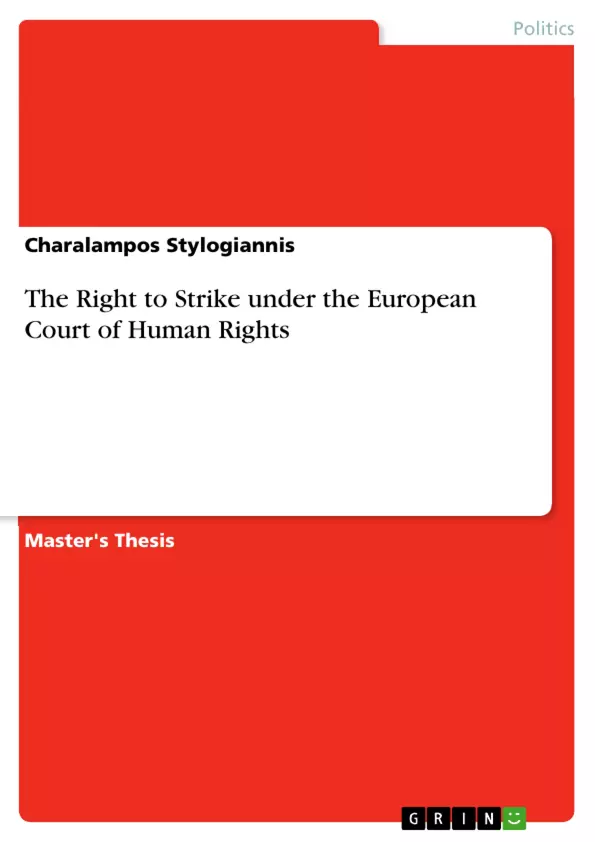This paper seeks to examine, from a human rights perspective, the degree of protection of the right to strike under Article 11 ECHR.
Chapter One examines whether Article 11 ECHR offers any possibility for reading into its provisions a general right to strike. It will scrutinise the initial reluctance of the ECtHR to proceed to such an interpretation, and thus to adequately safeguard the right at issue.
Chapter Two discusses the course through which the initial despair preceded the subsequent hope of the Demir and Baykara judgement while considering the case’s impacts on the protection of the right to strike.
Chapter Three critically examines the decision in the RMT v. UK case, in which the ECtHR appeared to misplace any optimism its previous jurisprudence had generated. It will focus on the UK’s problematic pre-industrial notices which are necessary for the workers in escaping tortious liability, and on the classification, by the Court, of a secondary action as an ‘‘accessory’’, rather than a core aspect of trade unions’ activity.
Chapter Four at first refers to the importance of the right to strike as a human right. It is argued that its enhanced protection can result in the promotion of human rights for both those taking part in the industrial action and those who are not formally engaged in the dispute. Finally, it discusses why the ECHR constitutes the 'safest' route through which individuals and trade unions can challenge breaches vis a vis the right to strike.
Inhaltsverzeichnis (Table of Contents)
- Introduction
- The European Court of Human Rights and the Interpretation of Article 11 ECHR:
- The Court's 'Restrictive' approach towards the Interpretation of Article 11 ECHR.
- The Case of Demir and Baykara v. Turkey: The 'U-Turn' in the Court's Jurisprudence
- The Implications of the Judgment in Demir and Baykara v. Turkey on the Right to Strike
- The Case of RMT v. United Kingdom: The 'Hangover' of the European Court of Human Rights?
- The Importance of the Right to Strike as a Human Right and its Future Protection under the ECHR: An Enhanced or a Superficial Protection?
- The current developments and the increasing "hostility" towards labour rights: The ECtHR as the guardian of the right to strike?
Zielsetzung und Themenschwerpunkte (Objectives and Key Themes)
This paper examines the degree of protection afforded to the right to strike under Article 11 ECHR from a human rights perspective.
- The initial reluctance of the European Court of Human Rights (ECtHR) to interpret Article 11 ECHR as encompassing a general right to strike.
- The impact of the Demir and Baykara v. Turkey case on the protection of the right to strike.
- The implications of the RMT v. United Kingdom case for the future protection of the right to strike.
- The importance of the right to strike as a fundamental human right and its potential for promoting human rights beyond those directly involved in industrial action.
- The role of the ECtHR in safeguarding the right to strike in the face of increasing hostility towards labour rights.
Zusammenfassung der Kapitel (Chapter Summaries)
Chapter One examines the initial reluctance of the ECtHR to interpret Article 11 ECHR as encompassing a general right to strike. It scrutinizes the Court's initial reluctance to adequately safeguard the right at issue.
Chapter Two discusses the shift in the ECtHR's jurisprudence following the Demir and Baykara v. Turkey case and considers the impact of this "U-turn" on the protection of the right to strike.
Chapter Three critically examines the decision in the RMT v. UK case, in which the ECtHR seemed to contradict its previous jurisprudence. It focuses on the UK's pre-industrial notice requirements and the Court's classification of secondary action as an "accessory" rather than a core aspect of trade union activity.
Schlüsselwörter (Keywords)
The key concepts and themes explored in this paper include the right to strike, Article 11 ECHR, freedom of association, collective bargaining, trade unions, human rights, ECtHR jurisprudence, Demir and Baykara v. Turkey, RMT v. United Kingdom, and the evolving landscape of labour rights protection.
Frequently Asked Questions
Does Article 11 of the ECHR protect the right to strike?
While not explicitly stated, the European Court of Human Rights has interpreted Article 11 (Freedom of Assembly and Association) to include the right to strike, though protection levels have fluctuated.
What was the significance of the Demir and Baykara v. Turkey case?
This case marked a "U-turn" in the Court's jurisprudence, significantly enhancing the protection of trade union rights and the right to collective bargaining under the ECHR.
How did the RMT v. United Kingdom case affect labor rights?
The decision was seen as a step back, as the Court classified secondary industrial action as an "accessory" rather than a core activity of trade unions.
Why is the ECHR considered a 'safe' route for trade unions?
It provides a legal framework through which individuals and unions can challenge national breaches of labor rights before an international human rights body.
What are pre-industrial notices in the UK context?
They are mandatory legal requirements for workers to escape tortious liability before taking industrial action, which the paper examines as a potential barrier to the right to strike.
- Quote paper
- Charalampos Stylogiannis (Author), 2016, The Right to Strike under the European Court of Human Rights, Munich, GRIN Verlag, https://www.grin.com/document/350499



